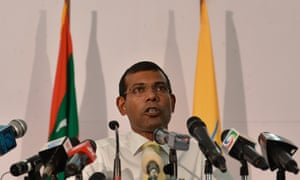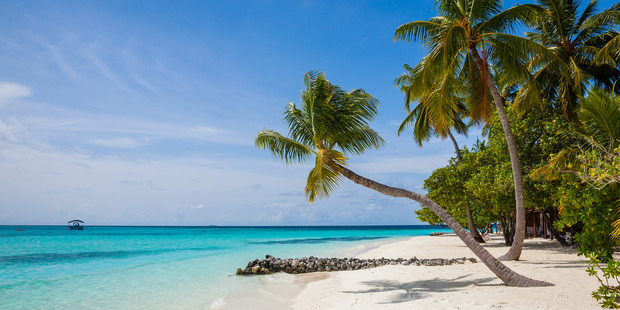Decision based on Mohamed Nasheed’s complaint of procedural irregularities in his trial on terrorism charges.

The Maldives’ prosecutor general has said he will appeal against the conviction of former president and opposition leader Mohamed Nasheed, who was jailed for 13 years in March after a trial the UN described as “vastly unfair”.
A statement released by the prosecutor general’s office said the decision was based on Nasheed’s complaint of procedural irregularities in his trial, including “the violation of some fundamental rights and inadequate time to prepare his defence”.
“The prosecutor general of the Maldives has decided to appeal the case of former president Mohamed Nasheed,” it said.
The president, Abdulla Yameen, has faced a chorus of international criticism over the jailing of Nasheed, the first democratically elected leader of the archipelago, on charges of terrorism.
Nasheed’s lawyers resigned before the end of his brief trial, saying it was biased and aimed at destroying his political career.
It came at a time of growing opposition to Yameen’s government and was expected to prevent Nasheed from running for president in elections in 2018.
The US secretary of state, John Kerry, warned in May that democracy in the Maldives was under threat, saying Nasheed had been “imprisoned without due process”, and urging a rethink.
An international team of lawyers, including London-based human rights lawyer Amal Clooney, has petitioned the United Nations over Nasheed’s controversial jailing.
Nasheed, a climate change activist who was imprisoned during the three-decade rule of former strongman Maumoon Abdul Gayoom, became the country’s first democratically elected leader in 2008. He was toppled in February 2012 after a mutiny by police and troops that followed weeks of protests over the arrest of a top judge who had been appointed by Gayoom.
Nasheed had ordered the arrest, and it formed the centrepiece of his prosecution.
Yameen, the half-brother of Gayoom, controversially beat Nasheed in an election runoff in late 2013 despite trailing in the first round.
The Nasheed controversy has dealt a further blow to the image of the Maldives as an upmarket tourist destination, already marred by political unrest on the streets of the capital since he lost power in 2012.
In May Nasheed’s lawyer filed a petition with the UN arguing his detention was illegal and a violation of international law. His wife Laila Ali also visited Washington to lobby the White House, State Department and Congress over his detention.
The Maldives government had always insisted he had received a fair trial. But last month, Nasheed was moved out of his prison cell and confined to house arrest while he received medical treatment, in what some saw as a possible sign of softening towards him.

A statement released by the prosecutor general’s office said the decision was based on Nasheed’s complaint of procedural irregularities in his trial, including “the violation of some fundamental rights and inadequate time to prepare his defence”.
“The prosecutor general of the Maldives has decided to appeal the case of former president Mohamed Nasheed,” it said.
The president, Abdulla Yameen, has faced a chorus of international criticism over the jailing of Nasheed, the first democratically elected leader of the archipelago, on charges of terrorism.
Nasheed’s lawyers resigned before the end of his brief trial, saying it was biased and aimed at destroying his political career.
It came at a time of growing opposition to Yameen’s government and was expected to prevent Nasheed from running for president in elections in 2018.
The US secretary of state, John Kerry, warned in May that democracy in the Maldives was under threat, saying Nasheed had been “imprisoned without due process”, and urging a rethink.
An international team of lawyers, including London-based human rights lawyer Amal Clooney, has petitioned the United Nations over Nasheed’s controversial jailing.
Nasheed, a climate change activist who was imprisoned during the three-decade rule of former strongman Maumoon Abdul Gayoom, became the country’s first democratically elected leader in 2008. He was toppled in February 2012 after a mutiny by police and troops that followed weeks of protests over the arrest of a top judge who had been appointed by Gayoom.
Nasheed had ordered the arrest, and it formed the centrepiece of his prosecution.
Yameen, the half-brother of Gayoom, controversially beat Nasheed in an election runoff in late 2013 despite trailing in the first round.
The Nasheed controversy has dealt a further blow to the image of the Maldives as an upmarket tourist destination, already marred by political unrest on the streets of the capital since he lost power in 2012.
In May Nasheed’s lawyer filed a petition with the UN arguing his detention was illegal and a violation of international law. His wife Laila Ali also visited Washington to lobby the White House, State Department and Congress over his detention.
The Maldives government had always insisted he had received a fair trial. But last month, Nasheed was moved out of his prison cell and confined to house arrest while he received medical treatment, in what some saw as a possible sign of softening towards him.






